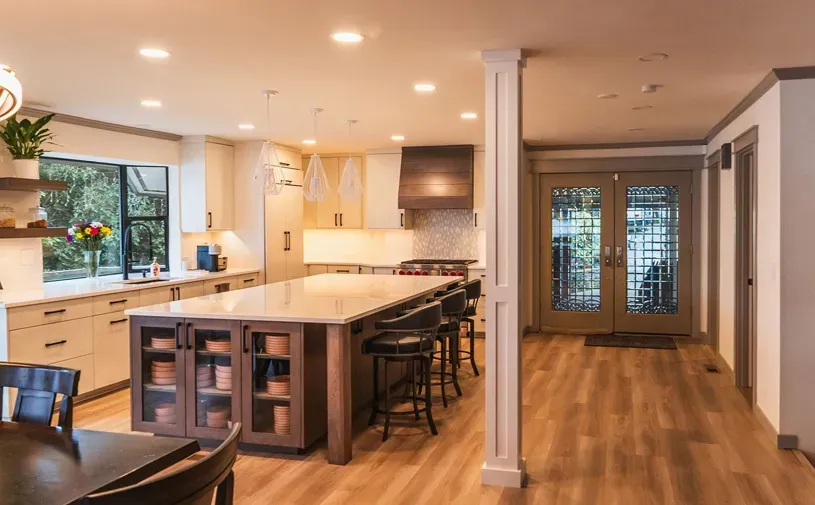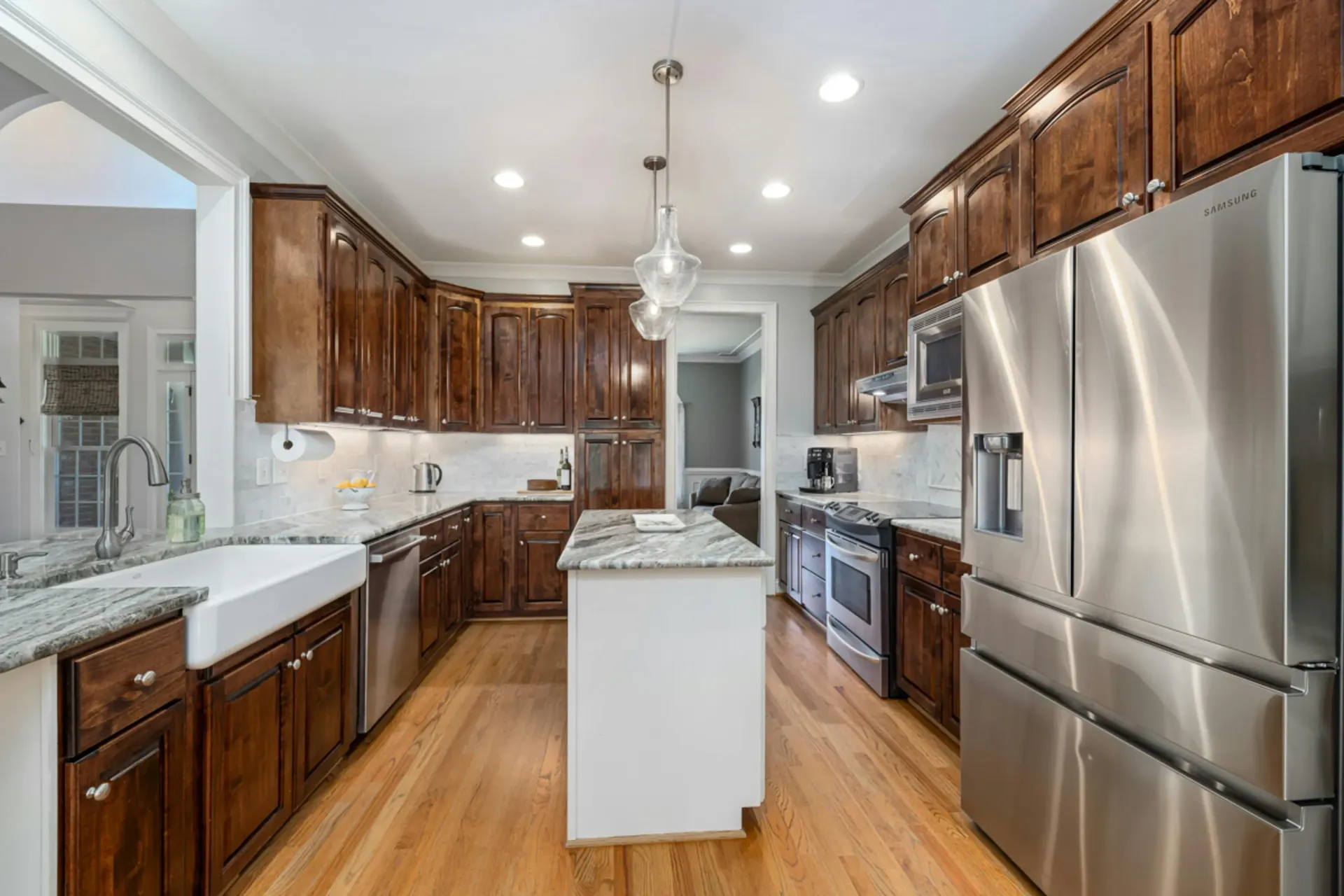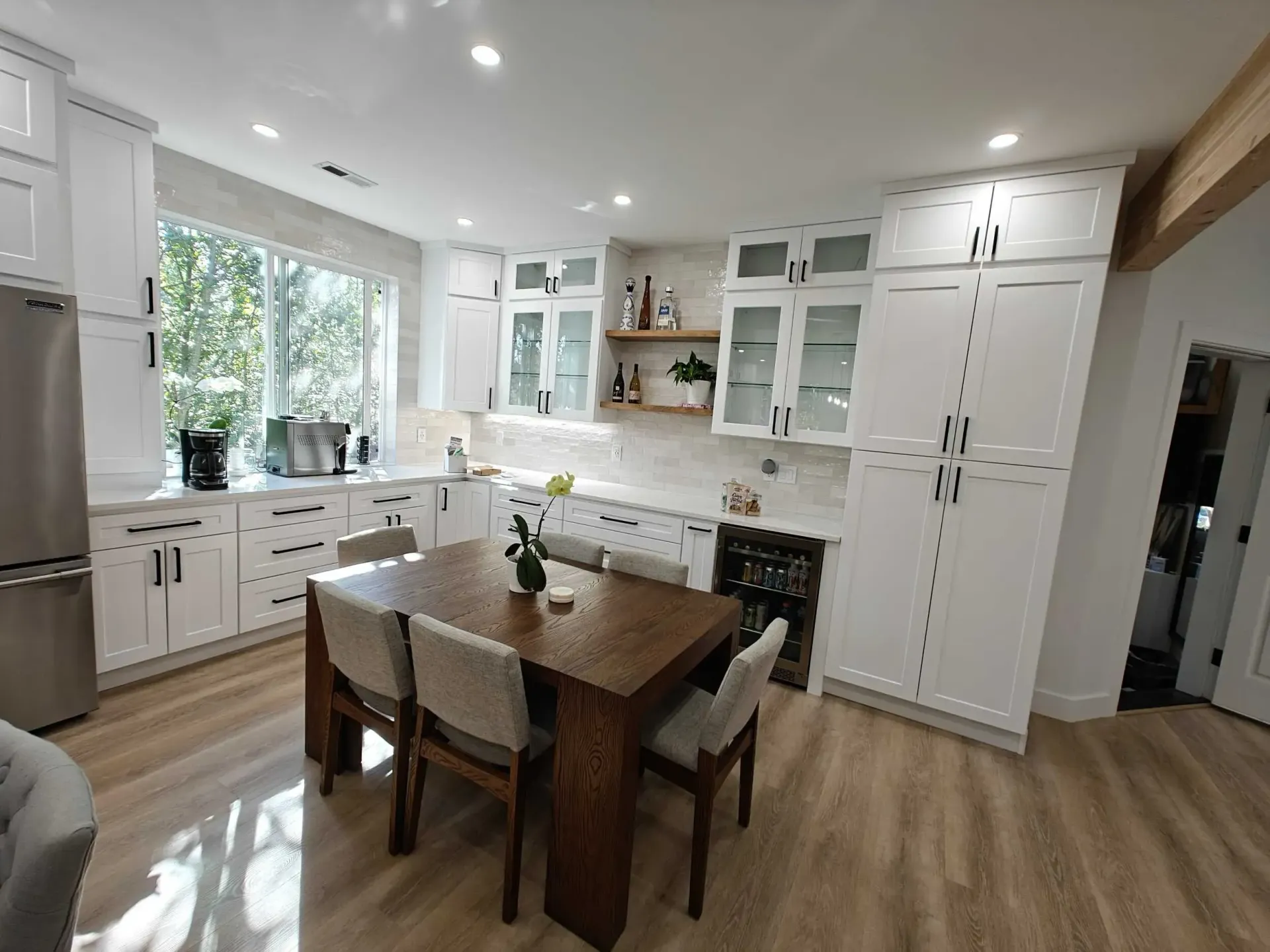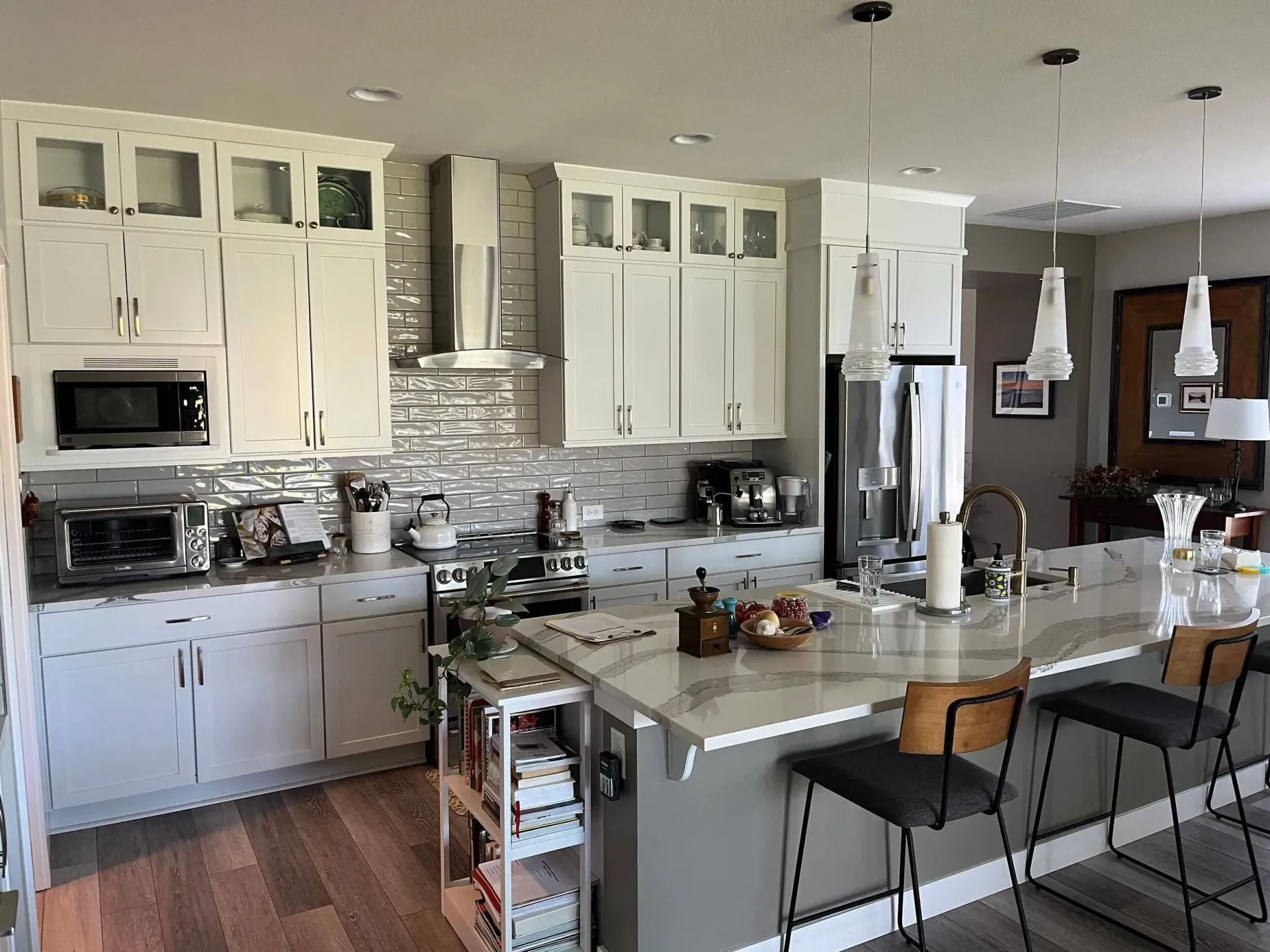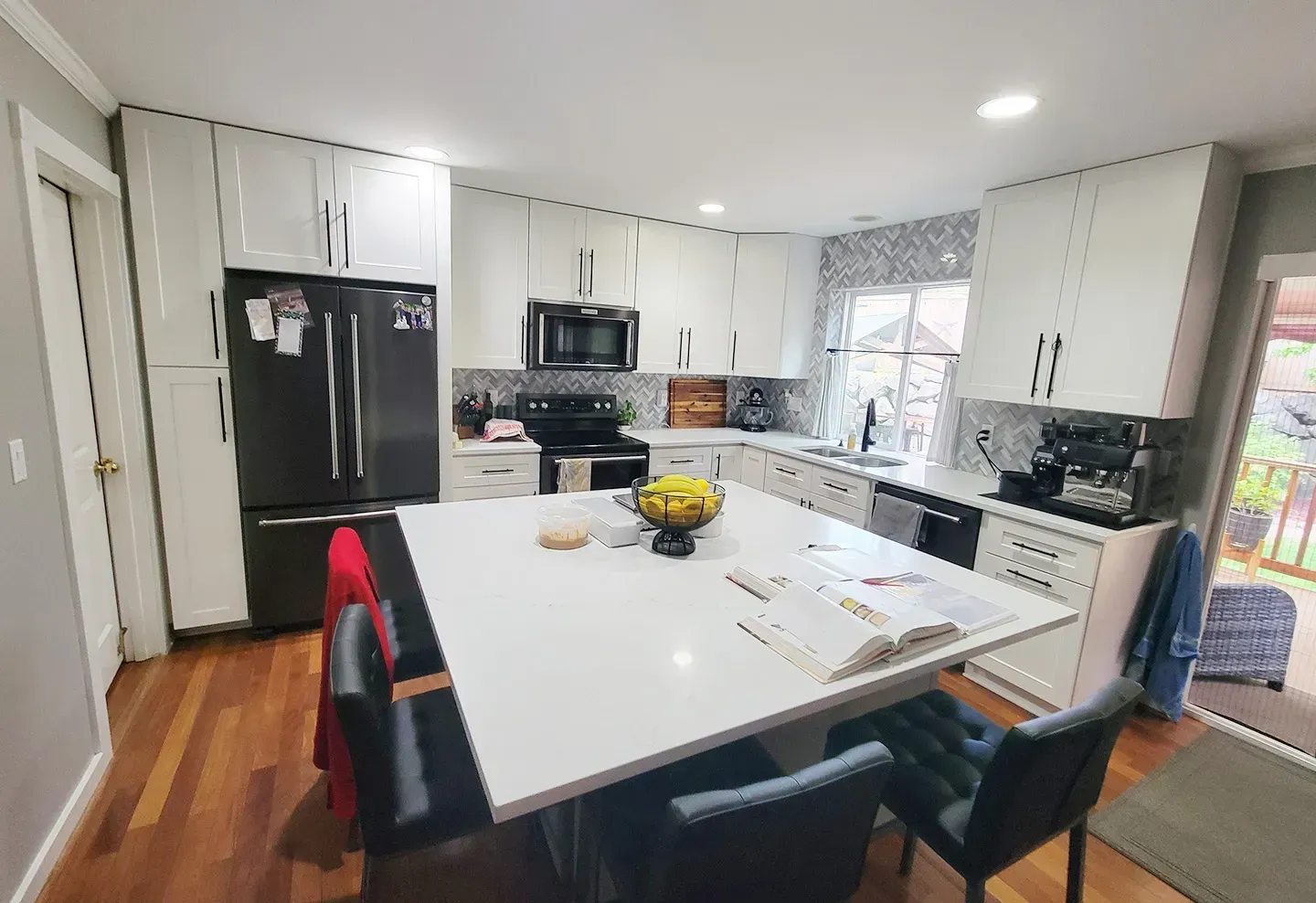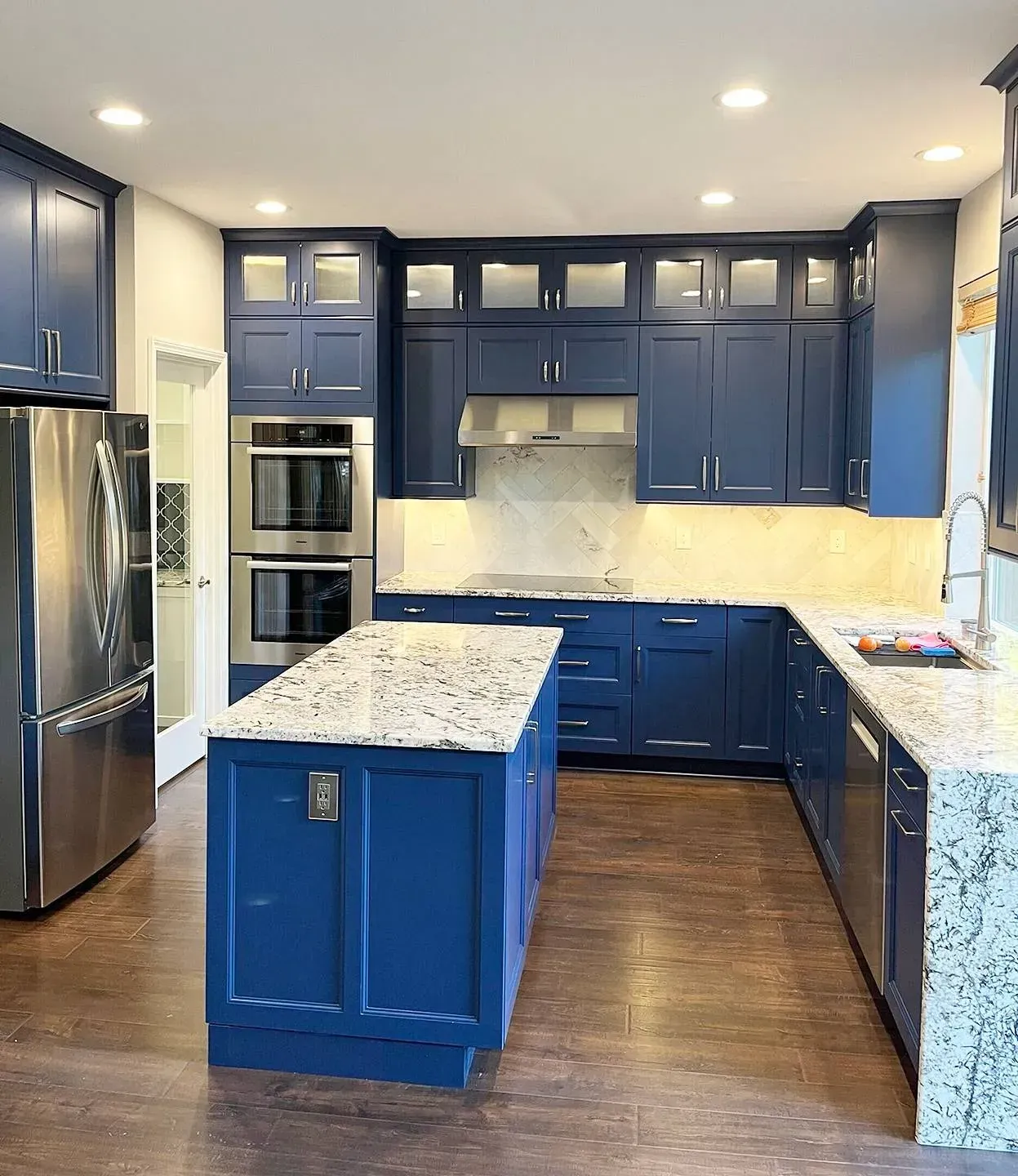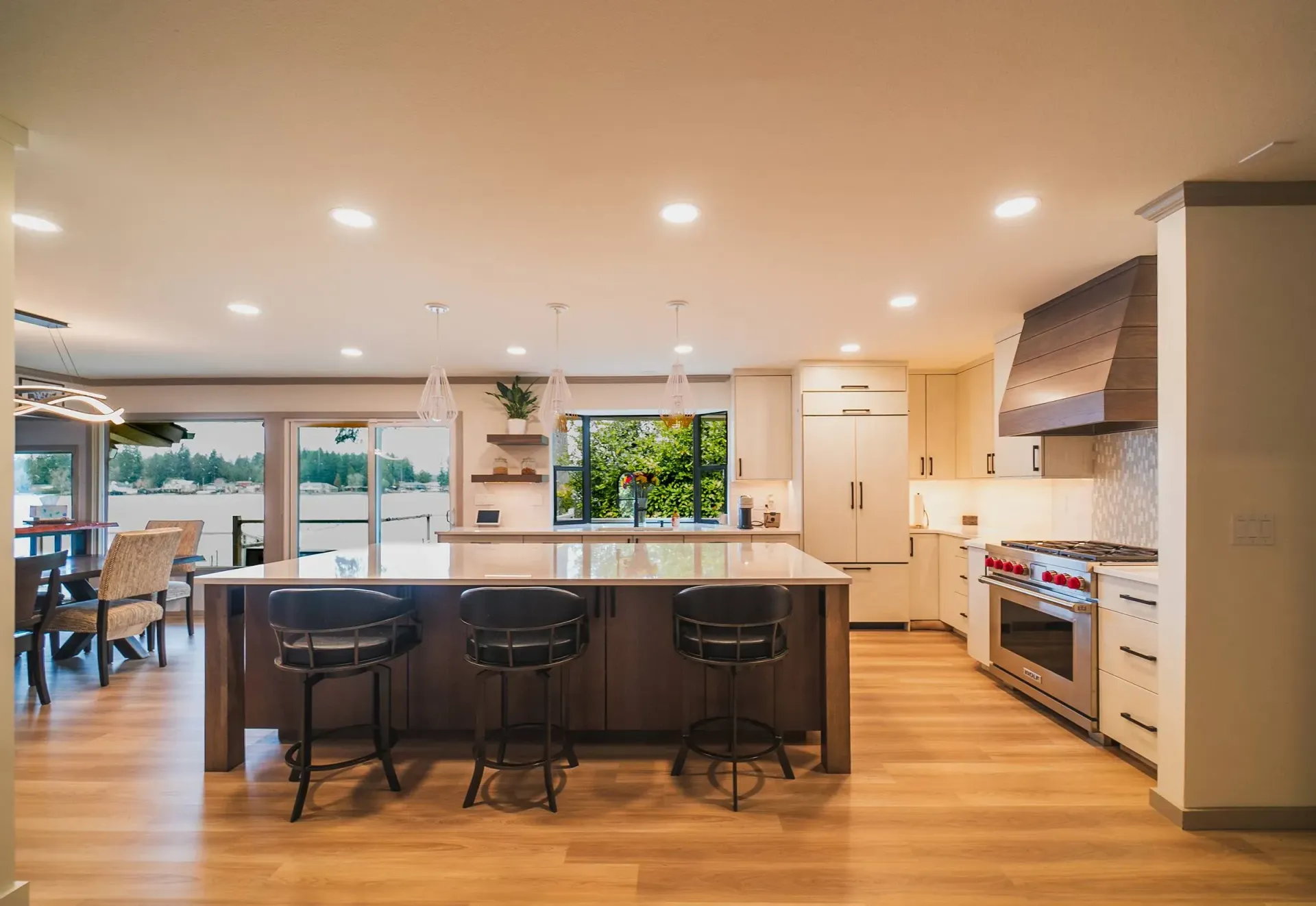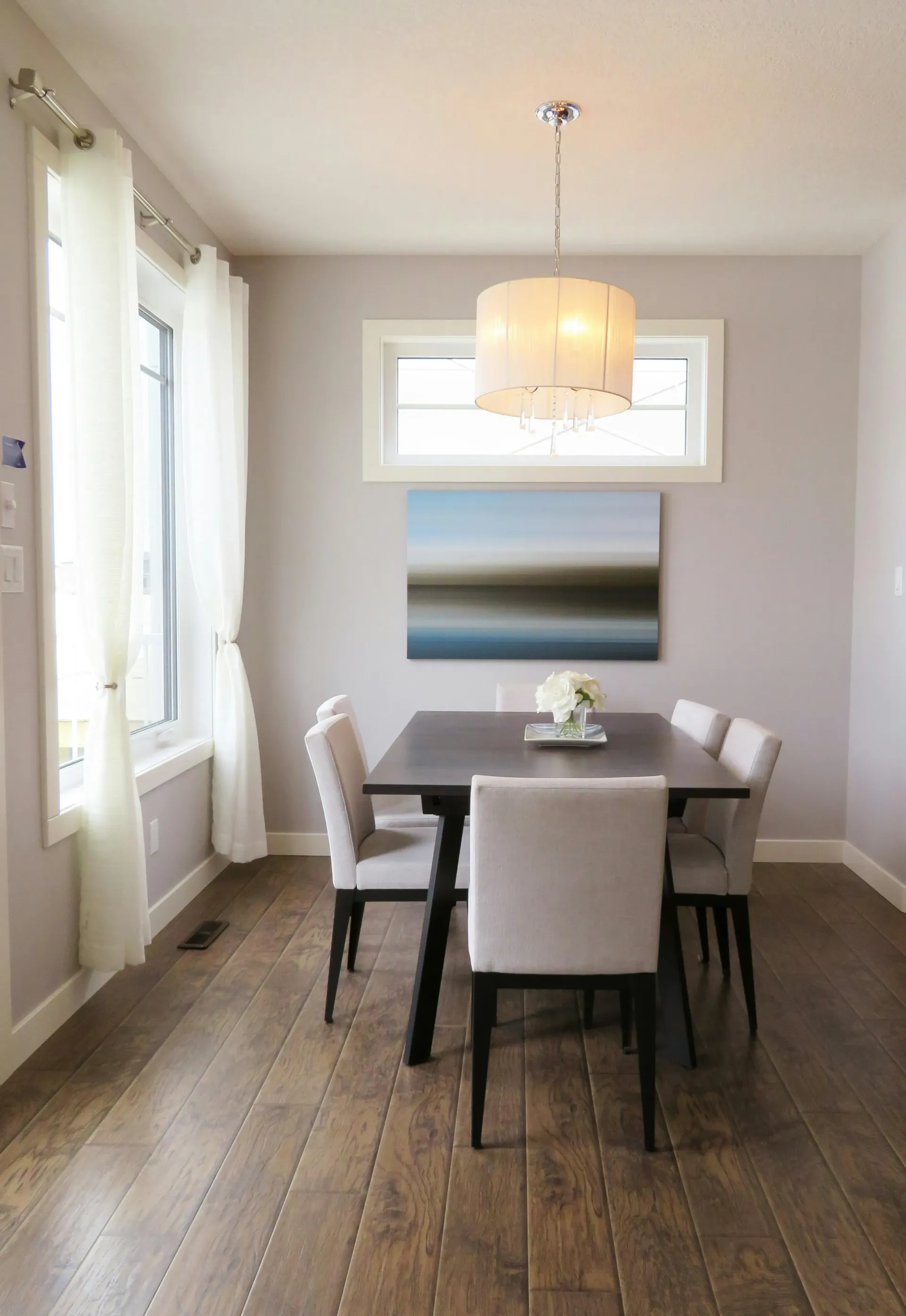Granite Countertops vs. Butcher Block Countertops
When it comes to choosing the perfect countertop for your kitchen, two contenders often steal the spotlight: granite and butcher block countertops.
Granite countertops offer a luxurious and durable surface, while butcher block countertops provide a warm and rustic charm.
Each material has its own advantages and drawbacks, so it’s important to consider your specific needs and aesthetic preferences.
But how do you decide which is the right fit for your culinary sanctuary?
In this article, we will explore the pros and cons of granite and butcher block countertops, maintenance tips, factors to consider when choosing between the two, durability comparisons, and design trends. Here are the key takeaways:
Key Takeaways
- Granite countertops are known for their durability and luxurious appearance.
- Butcher block countertops offer a warm and rustic charm, but require regular maintenance.
- Consider factors such as budget, style, and maintenance requirements when choosing between granite and butcher block.
- There are budget-friendly alternatives to both granite and butcher block countertops.
- Mixing granite and butcher block can create a unique and stylish look in your kitchen.
What’s the Buzz About Granite Countertops?
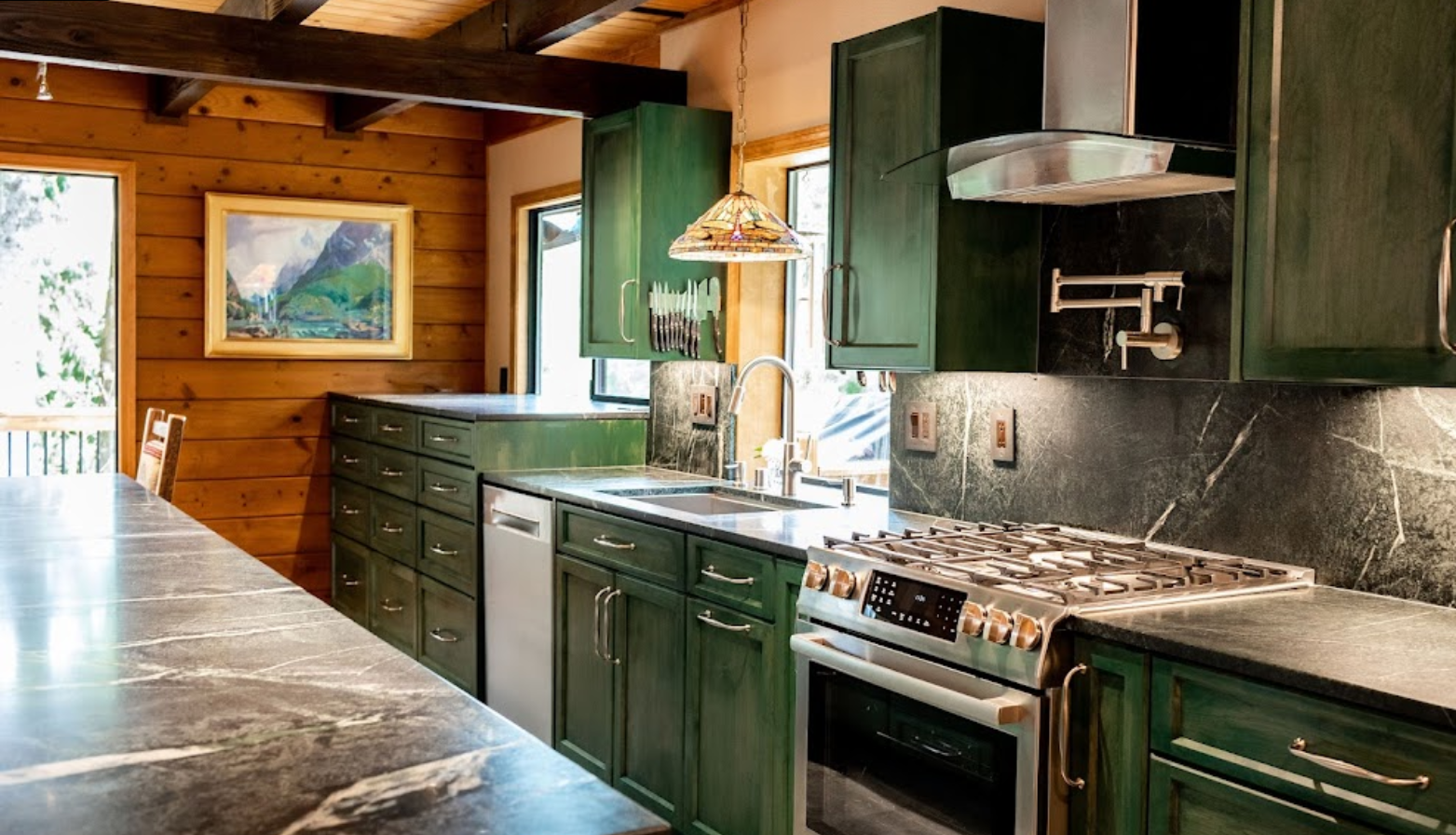
The Pros of Granite Countertops
Granite countertops are a popular choice for homeowners looking to add a touch of elegance and durability to their kitchen. With their natural beauty and unique patterns, granite countertops can instantly elevate the aesthetic appeal of any kitchen.
But it's not just about looks. Here are some key advantages of choosing granite countertops:
- Durability: It stands remarkably well to daily wear and tear.
- Longevity: When properly installed and maintained, it can last a lifetime.
- Variety: It has a wide range of colors and patterns that makes it easy for you to find the perfect match for your kitchen’s theme and color scheme.
- Value Addition: They add value to your home which makes it a sought-after feature in real estate.
- Low Maintenance: Regular cleaning with mild soap and water is typically enough to maintain its luster.
The Cons of Granite Countertops
While granite countertops offer many benefits, there are a few drawbacks to consider. It's important to weigh the pros and cons before making a decision. Here are some things to keep in mind:
- Cost: High-quality granite can be on the pricier side.
- Weight: It requires sturdy cabinet bases and sometimes additional support.
- Seams: Skilled installers can minimize this. It depends on the counter’s layout.
- Porous Nature: If not sealed properly, granite can absorb liquids, leading to stains.
Maintenance Tips for Granite Countertops
Granite countertops are known for their durability and low maintenance requirements. With proper care, they can last for decades without losing their shine or beauty. Here are some tips to keep your granite countertops looking their best:
Daily Cleaning and Immediate Spill Response
Keep your granite countertops pristine with daily cleaning using a soft cloth, warm water, and mild, pH-neutral soap. Swiftly address spills, especially acidic ones like wine and tomato sauce, to prevent stains and etching.
Protective Measures
Utilize coasters for glasses and trivets for hot dishes to safeguard your countertops from stains and thermal damage. Also, avoid cutting directly on granite to preserve both your knives and the countertop's finish.
Regular Sealing
Apply a sealant to your granite countertops upon installation and maintain this protective layer by resealing every one to two years. This step is crucial in preventing stains and maintaining the stone's integrity.
Avoid Harsh Chemicals and Abrasives
Steer clear of bleach, harsh cleaners, and abrasive materials that can strip the sealer and damage the granite's surface. Opt for cleaners specifically formulated for granite for deeper cleaning. For more tips, read about How to Care for Your New Tile to Keep It Looking New.
Professional Assistance for Major Concerns
For significant issues like chips, cracks, or stubborn stains, seek professional help. DIY attempts can exacerbate these problems, so it's best to trust experts for repair and maintenance.
Following these five key tips ensures that your granite countertops remain a durable and beautiful centerpiece in your home for years to come.
Why Butcher Block Countertops are Making a Comeback
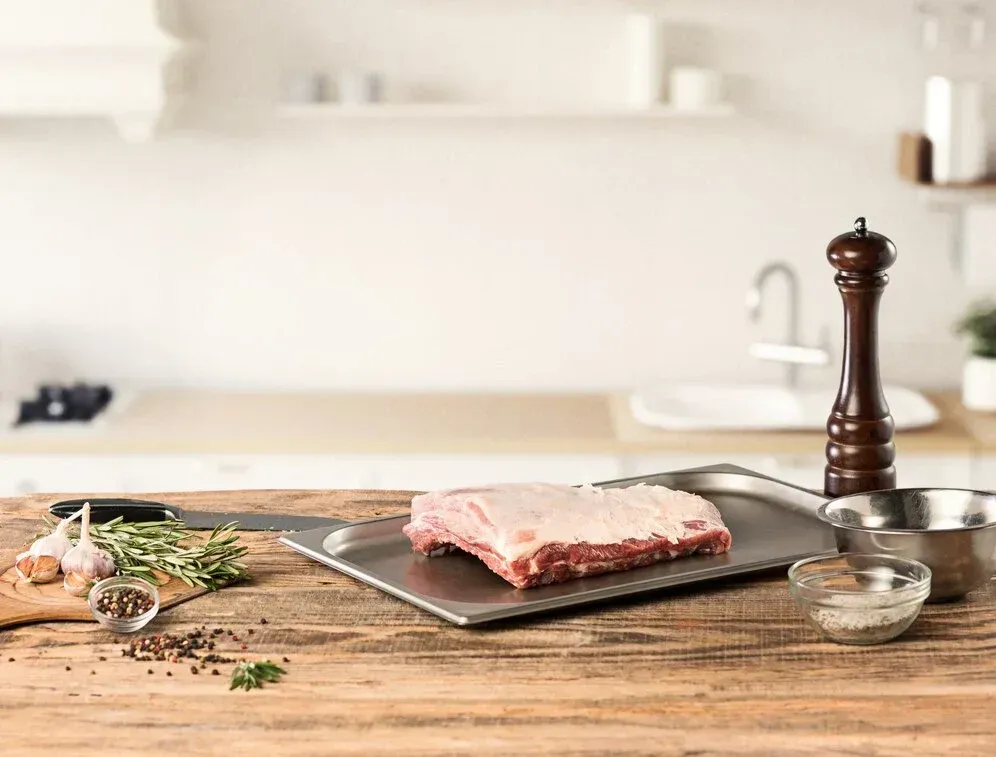
The Advantages of Butcher Block Countertops
Butcher block countertops have gained popularity in recent years due to their unique characteristics and benefits. Unlike other countertop materials, such as granite, butcher block countertops offer a warm and inviting aesthetic that adds a touch of rustic charm to any kitchen. They are made from solid wood, typically maple or oak, which gives them a natural and organic feel.
Here are some reasons why you must also consider butcher block countertops:
- Eco-Friendly: Butcher block countertops often come from reclaimed or sustainably harvested wood, making them an excellent choice for environmentally conscious homeowners.
- Unique Aesthetic Appeal: The natural beauty of wood, with its distinctive grain patterns and warm tones, brings a rustic charm and inviting atmosphere to any kitchen. This aesthetic versatility makes them suitable for a range of interior designs, from modern to traditional.
- Cost-Effective and Customizable: Butcher block offers a budget-friendly alternative to more expensive countertop materials. Their versatility extends to customization in terms of wood types, finishes, and stains, allowing for a tailored look that fits your specific kitchen style and preferences. For more space-saving ideas, read about Effective Ways to Add Storage Space to Small Kitchen Spaces.
Question: Are butcher blocks sanitary?
Answer: Yes. Contrary to popular opinion, as long as it is well-maintained, they should remain sanitary, a safe place to prepare cooking-related tasks.
- Hygienic and Heat Resistant: Wood's natural antibacterial properties make butcher block countertops a hygienic option for food preparation. Additionally, their inherent heat resistance is ideal for kitchens where hot pans and cooking utensils are frequently used.
The Drawbacks of Butcher Block Countertops
While butcher block countertops have gained popularity in recent years, it's important to consider their drawbacks before making a decision. Here are some key points to keep in mind:
- Regular Maintenance Required: To preserve their appearance and longevity, butcher block countertops require more maintenance than other materials. Regular oiling and sealing are necessary to prevent drying, cracking, and warping.
- Vulnerability to Stains and Scratches: Butcher block is prone to stains, especially from liquids like wine or oil, if not properly sealed. Scratches and cuts can also be an issue, particularly in high-use areas.
- Water Damage Risk: Prolonged exposure to water can damage butcher block countertops. Areas around the sink are particularly susceptible to water damage, such as warping and rotting, if not adequately protected and maintained.
- Bacterial Growth Concerns: While wood has natural antibacterial properties, improper cleaning and maintenance can lead to bacterial growth in cuts and scratches on the surface.
- Potential for Inconsistent Coloring: Over time, exposure to sunlight and use can lead to uneven coloring or fading, which may not appeal to all homeowners.
While butcher block countertops offer warmth and charm to a kitchen, they come with maintenance considerations and potential durability issues. Weighing these drawbacks against their aesthetic and functional benefits is crucial for homeowners to make an informed decision that aligns with their lifestyle and kitchen use.
How to Care for Butcher Block Countertops
Caring for your butcher block countertops is essential to maintain their beauty and functionality. With proper care, your countertops can last for years to come. Here are some tips to keep your butcher block countertops in top shape:
Consistent Oiling and Sealing: Regularly treat your butcher block countertops with food-safe mineral oil or a specialized conditioner. This routine, ideally done monthly, maintains the wood's moisture, prevents cracking, and offers a protective barrier against stains and water damage.
Prompt Spill Management and Gentle Cleaning: Address spills immediately to prevent staining, especially from liquids like wine and oil. For daily cleaning, use a soft cloth and mild detergent, steering clear of harsh chemicals or abrasive materials that can harm the wood's surface.
Protection from Scratches and Heat: Utilize cutting boards during food preparation to prevent scratches. To safeguard against heat damage, use trivets or hot pads when placing hot items on the countertops.
Regular Maintenance Checks: Regularly inspect your countertops for signs of wear such as warping, cracking, or deep scratches. Early detection allows for timely repairs, like sanding or resealing, to maintain the countertop's integrity and appearance.
Water Exposure Management: Keep areas around sinks dry and consider a waterproof sealant for these zones. This proactive approach helps prevent water-related damages like warping or rotting, ensuring the longevity of your butcher block countertops.
Choosing the Right Countertop for Your Kitchen
Factors to Consider When Choosing Between Granite and Butcher Block
When deciding between granite and butcher block countertops for your kitchen, there are several factors to consider. Both options have their own unique advantages and drawbacks, so it's important to weigh them carefully before making a decision. Here are some key points to keep in mind:
Aesthetic and Style: Granite offers a sleek, polished look and is available in a variety of colors and patterns. It suits modern and luxurious kitchen designs. Butcher block, on the other hand, provides a warm, rustic charm that works well in country, farmhouse, or traditional kitchens.
Durability and Maintenance: Granite is known for its durability and resistance to heat, scratches, and stains, requiring minimal maintenance. Butcher block requires more upkeep, including regular oiling and sealing, and is more susceptible to scratches, stains, and water damage.
Budget Considerations: Generally, granite can be more expensive than butcher block, depending on the quality and rarity of the stone. Butcher block is often a more budget-friendly option and offers the added benefit of being repairable and renewable. For more insights, read about Why Home Remodeling is a Smart Investment.
Environmental Impact: If sustainability is a priority, butcher block, especially those made from reclaimed or sustainably sourced wood, is a more eco-friendly choice. Granite mining and shipping have a higher environmental impact.
Installation and Weight: Granite is heavier and may require additional support structures, potentially increasing installation costs. Butcher block is lighter and easier to install, offering more flexibility for DIY projects.
Hygiene and Food Safety: Granite, being non-porous, resists bacteria and is easy to clean, making it a hygienic option for kitchens. While butcher block has natural antibacterial properties, it requires careful cleaning and maintenance to prevent bacteria buildup in cuts and scratches.
Resale Value: Granite countertops are often more sought-after in the real estate market, potentially adding more value to your home. Butcher block also adds value but might have a more niche appeal. For more on this, see The Benefits of Hiring a Professional Home Remodeling Contractor in Washington.
Budget-Friendly Alternatives to Granite and Butcher Block
Looking for more affordable options? Consider these alternatives to granite and butcher block countertops:
Laminate Countertops: Laminate is a highly cost-effective option that comes in a range of colors and designs, including ones that mimic the look of granite or wood. It's easy to maintain, although it's not as durable as granite or butcher block and can be prone to scratches and heat damage.
Solid Surface Countertops: Made from a blend of acrylics and minerals, solid surface countertops offer a seamless look and come in various patterns and colors. While not as heat-resistant as granite, they're non-porous and resist stains and bacteria growth.
Ceramic Tile Countertops: Ceramic tiles are versatile, affordable, and come in an array of styles, colors, and finishes. They are heat-resistant and easy to clean but can be prone to chipping or cracking, and the grout lines require regular maintenance to prevent staining.
Quartz Countertops: While generally less expensive than granite, quartz countertops offer a similar level of durability and aesthetic appeal. They're non-porous, making them resistant to stains and bacteria, and don’t require sealing.
Concrete Countertops: Concrete countertops are increasingly popular for their industrial look and customization options. They are relatively affordable and can be dyed or textured to suit your style. However, they do require sealing and can be susceptible to cracks.
Recycled Glass Countertops: For an eco-friendly and unique option, consider recycled glass countertops. They offer a modern look and are durable, though they can be on the higher end of the budget-friendly scale.
Finding the Perfect Balance: Mixing Granite and Butcher Block
One popular trend that has emerged in recent years is the combination of granite and butcher block. This unique pairing allows homeowners to enjoy the best of both worlds, with the durability and elegance of granite and the warmth and charm of butcher block. For more ideas on how to mix and match these materials, read Maximizing Space: Tips for Home Additions.
If you're looking for a premier home remodeling company in Maple Valley, Washington, look no further than Tubro Construction. With years of experience and a team of skilled professionals, Tubro Construction can help bring your dream kitchen to life. Visit our website today to learn more about our services and to schedule a consultation.
Conclusion
In conclusion, both granite countertops and butcher block countertops have their own unique advantages and disadvantages. Granite countertops are known for their durability and low maintenance, making them a popular choice for many homeowners. On the other hand, butcher block countertops offer a warm and rustic look that can add character to any kitchen. When choosing between the two, it's important to consider factors such as budget, style preferences, and maintenance requirements. Additionally, there are budget-friendly alternatives to both options for those looking for a more affordable option. Ultimately, the decision comes down to personal preference and finding the perfect balance between granite and butcher block for a unique and stylish kitchen design.


